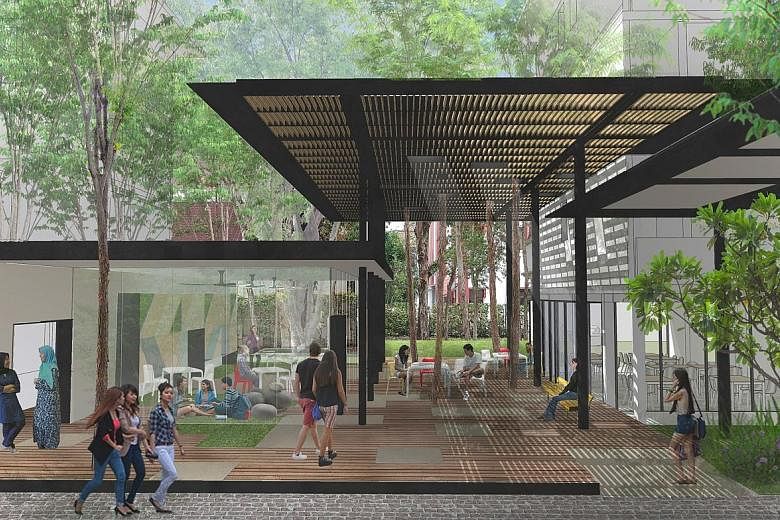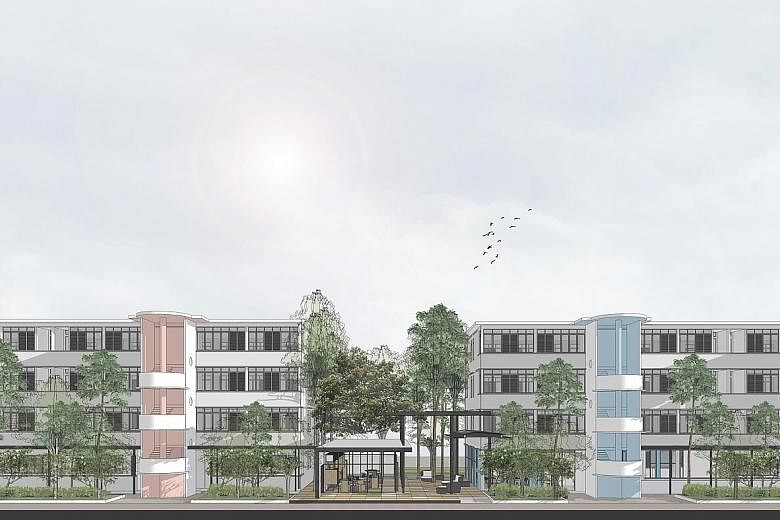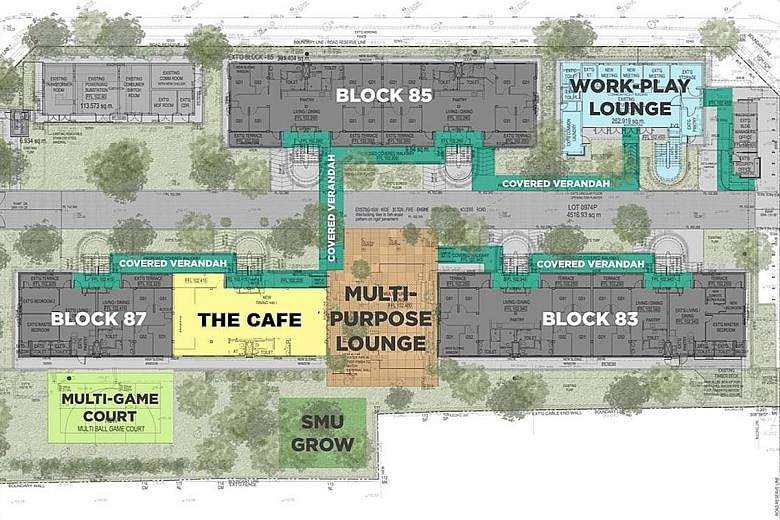City accommodation in the Singapore Management University (SMU) will soon go beyond just providing students with a place to stay. Spaces for them to learn will be offered too.
From August, undergraduates can stay at the Prinsep Street Residences, which will be the university's test bed for a new residential learning and living concept.
The three blocks of four-storey apartments in Prinsep Street - former Singapore Improvement Trust buildings - used to house about 260 SMU students, 90 per cent of whom were foreigners.
Work to renovate the 5,000 sq m space began last month and is expected to cost around $10 million.
Residential living and learning has been offered for a number of years at other universities here, such as the National University of Singapore (NUS) and Nanyang Technological University (NTU).
Fees for campus living at these institutions can range from $200 to $500 per month, inclusive of twin sharing.
The Prinsep Street Residences, which is eight minutes by foot from the SMU campus, will have 23 shared apartments, with living rooms and communal spaces for 255 students.
-
23
Number of shared apartments, with living rooms and communal spaces for 255 students. The monthly fee for a twin-sharing room is $590. For a single room, it is $772.
-
Living and learning on other campuses
-
NATIONAL UNIVERSITY OF SINGAPORE (NUS)
•Students have a few options - five residential colleges, seven halls of residence and two student residences. A total of 11,000 places on campus are offered each year, while the university has about 37,000 undergraduate and graduate students.
•About half of NUS freshmen get to stay on campus. Each year, about 2,700 freshmen apply to stay in the halls and student residences, while about 1,900 freshmen apply for a place in one of the five residential colleges.
•The residential colleges - the first of their kind in Singapore when they were set up in 2011 - offer two-year programmes where students take modules in small classes, and live and learn alongside peers and professors.
NANYANG TECHNOLOGICAL UNIVERSITY (NTU)
•NTU opened six residential halls over the last two years, bringing its total to 24 halls now.
•The residential halls house 14,200 undergraduates in total, fulfilling more than 90 per cent of current demand to stay on campus.
•Some of the halls have made space for a range of learning programmes such as a garage for making and tinkering with prototypes and technology.
SINGAPORE UNIVERSITY OF TECHNOLOGY AND DESIGN (SUTD)
•Currently, nearly 1,000 students - some 70 per cent of the undergraduate population - live on campus.
•It is mandatory for all SUTD freshmen to stay in the hostel during their first year, to help build strong bonds of friendship from the time they join the institution.
•Typically, about 90 per cent of undergraduates in their second to fourth years of studies who apply to stay on campus are allocated a place.
Amelia Teng
They will pay monthly fees of $590 for a twin-sharing room or $772 for a single room.
SMU has about 7,900 undergraduates. Students can start applying for places from next month, and at least half of the slots will be set aside for Singaporeans. This could go up to 70 per cent, depending on demand.
SMU provost Lily Kong said yesterday at a briefing: "It's more than a roof above their heads. It's building a community (of students) for the community."
Students living at the residences, which is on long-term lease to SMU until 2032, will be able to make use of a multi-purpose lounge and work-play lounge for projects, meetings and seminars.
For a start, SMU hopes to draw students interested in entrepreneurship and setting up new clubs.
Bringing like-minded students together
SMU dean of students Paulin Straughan said it will link students with relevant project ideas for the community to other voluntary welfare organisations and associations.
"We want to encourage like-minded students to get together and make things happen," Prof Straughan said.
Said Prof Kong: "Very often, learning is not a five-hour, three-hour, two-hour activity... You work until 11pm, midnight, and you go home."
She added that students had, over the years, expressed a desire for campus living.
"It's one thing that SMU hasn't offered to a large extent," she said, because of the high cost of city accommodation.
Ms Lim Wensi, manager of diversity, inclusion and integration at the Office of Dean of Students, will live alongside students and be known as a residential fellow, while director of the Office of Student Life Kenneth Tan will oversee the programmes as Prinsep Fellow.
Prof Straughan said that if students were keen, SMU would look at more residential sites in the long run. These sites may be further from the main campus, so that living costs can be more affordable, she said.
First-year SMU business student Ho Wen Siang said: "When we were applying for university two years ago, I knew of people who preferred to go to NUS or NTU because they offered campus living, unlike SMU."
The 21-year-old, who said living costs will be a deciding factor for students, is keen to find out more before applying for the new residences.
"But it's great that it's in the heart of the city; you can easily walk anywhere," he said.
"I live in Jurong East, an hour away from campus, so travelling takes up about two hours every day. Instead of travelling, I could spend more time on fruitful things (by staying on campus)."




